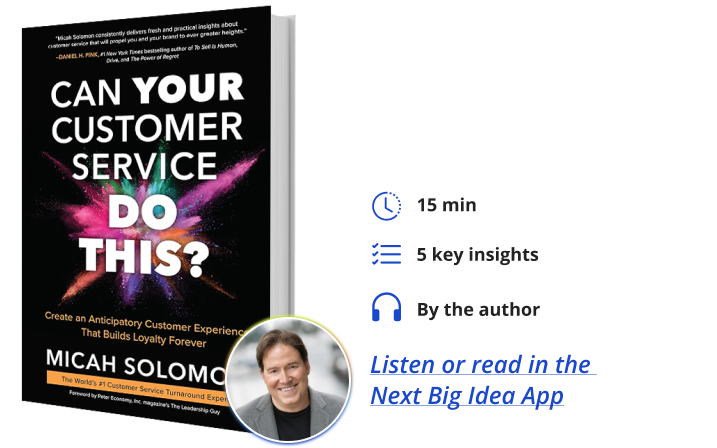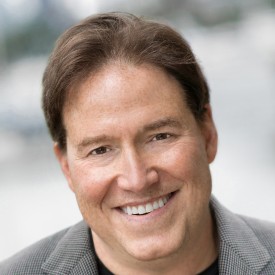Micah Solomon is a customer experience consultant, speaker, and trainer who has worked with grand hotels, auto dealerships, regional banks, credit unions, healthcare organizations, and more. He was termed “the world’s #1 customer service turnaround expert,” by Inc. Magazine and named by the Financial Post “The New Guru of Customer Service Excellence.” His writing is regularly featured in Forbes, Bloomberg BusinessWeek, Harvard Business Review, Washington Post, and elsewhere.
Below, Micah shares five key insights from his new book, Can Your Customer Service Do This?: Create an Anticipatory Customer Experience that Builds Loyalty Forever. Listen to the audio version—read by Micah himself—in the Next Big Idea App.

1. Exceptional customer service keeps companies out of the deadly commodity zone.
I’m going to guide you in creating, delivering, and sustaining exceptional customer service using the same approach I apply professionally to companies in practically every niche in the marketplace. But first, in cold, brutal business terms, why is delivering great customer service so valuable? Why is it worth investment and attention alongside all the other challenges a business faces?
Well, not to go all Eeyore on you, but it’s highly unlikely that your company and what it offers are entirely unique. Most companies hover much closer to the deadly commodity zone than anyone at those companies realizes. Odds are reasonable that this includes your company as well.
The commodity zone is one of the scariest places for a company to find itself. It’s when your business is viewed as more or less interchangeable with the competition, so your current customers are happy to jump ship to one of your competitors for a myriad of minor reasons:
- A slightly lower price.
- A faster website.
- A shinier app.
- A slightly more convenient location.
Or, sometimes, for no discernible reason at all. But there is a way you can spare your company from this fate: Build such a reputation for customer service excellence, and such a strong connection with every customer you touch, that your service becomes a point of distinction, a survival lifeline, and a powerful engine for growth.
An exceptional customer experience will create multiple positive results for your business, most centrally, the creation of passionately loyal customers. Loyal customers are:
- Less price sensitive.
- More likely to be interested in any new products, services, or brand extensions you may roll out.
- More understanding when things go sideways. (Once you’ve done so much, so well, for your customers, you achieve a state where the little mistakes—and even the occasional massive blunder—are looked upon in a better, more forgiving light.)
A loyal customer is also your best form of marketing. There is nothing more powerful than the ambassadorship of customers who are so engaged, so activated, that they take on the mission of spreading the good word about your company, sharing their passion with their online connections and real-life contacts.
2. Anticipatory customer service is service at the highest level.
The baseline customer service equation is when a customer asks for something, and you provide it to them. This has value, of course, but it’s not enough to build the loyalty relationship with your customers that will ultimately grow your business.
The secret to getting there is what I call anticipatory customer service. This means getting to where the hockey puck is headed before it gets there. It’s giving the customer what they want before they ask for it—and before they even know they want it.
“Anticipatory customer service involves hearing more than what a customer says out loud.“
Anticipatory customer service occurs when you seek out and take care of desires and needs that a customer has left unexpressed. Customers don’t ask for what they need because, among other reasons, they aren’t knowledgeable enough to realize that they could benefit from some aspect of your product or service, or they don’t even know that you can offer it. Or maybe they aren’t assertive and don’t want to be “too much of a bother,” so to speak.
Anticipatory customer service involves hearing more than what a customer says out loud. Taking care of unspoken needs and wishes and answering unvoiced questions is a master customer service behavior that will bring your company into a new reality: a destination populated with delighted customers who provide you with the kind of enthusiastic referrals that will help your company grow and prosper for the long term. There is nothing more powerful in the world of business.
3. Practice gold-touch customer service.
Let me tell you a story. Feeling the ever-more insistent tug of nature but not wanting to leave my laptop unattended for even a minute, I asked my server at the Madera restaurant, a Five-Star location in the heart of Silicon Valley, “How comfortable should I feel leaving my laptop on the table while I step out for a minute?”
“Very comfortable,” she answered, “because I will be here with it.” Then, she moved into an arms-crossed, standing guard position like a sentry guarding the Tower of London. And she was still holding that position (with perhaps a bit of humorous exaggeration) when I returned. What my spectacularly well-trained server at this Forbes-rated restaurant was practicing is what I call gold-touch customer service.
Gold-touch customer service comes in two varieties. The first is the do-extra: giving a customer more of your effort than they’ve asked for or could reasonably expect. The second variety of gold-touch is the tell-extra: providing a customer with unexpected, additional value by answering a question with particular thoroughness or by making a connection with a customer on a human, shared passion level.
Here are a few Gold-Touch examples in various industries and contexts. First are some do-extras:
- A pet grooming outfit could send their furry customer home with a blue or pink bandana after the poor guy makes it through the grooming ordeal.
- An employee at a car dealership could pair a customer’s cell phone before they drive off the lot, rather than allowing them to drive away only to get frustrated (and perhaps even into a fender bender) while trying to handle it themselves down the road.
- A hair salon employee could run out and feed the parking meter for an arriving client so they don’t have to fumble around trying to find change.
And here are some examples of tell-extras:
- A cashier at the checkout line could admire— sincerely—one of the articles a customer is purchasing. (This one requires nuance. Trader Joe’s is generally great at this, but sometimes they overdo it and don’t seem completely sincere.)
- If your company sells a product that new customers sometimes find confusing, you could include helpful, very specific links or even a brief and highly personalized introductory tutorial video.
Now I hear you saying, “Seriously, Micah, how am I expected to find time for this?” But while more elaborate gold touches do take time, if you don’t have time for those yet (and I predict you will start to make time once you see how effective this is), there are still opportunities for gold touches that are ripe for easy plucking, so long as you have a gold-touch mindset and are paying even a smidgeon of attention:
- Any time something doesn’t go as well as expected, you have a chance to go the extra mile in a gold-touch sort of way and possibly turn the customer’s day around.
- Any time something goes right for a customer is also a great time to gold touch them, whether it’s simply expressing to the customer your happiness at hearing how happy they are or sending them a card congratulating them on their new success.
- And any time a customer neglects to ask for something that you, in your professional judgment, know they would benefit from. This could be, for a security company, introducing your customer to the value of installing water leak sensors before they go away on vacation and a leaky disaster occurs in their absence.
4. A sense of purpose is what drives exceptional service.
Let’s focus for a moment on one hypothetical employee: a groundskeeper on the campus of a technology company, starting her workday early in the morning. The functional item that she intends to get done this morning is planting tulip bulbs—two cartons’ worth, 200 bulbs in all.
That is, until she notices a small sinkhole—deep enough to turn an ankle—right in the middle of the gravel path that the company’s clients, vendors, and employees will be walking on later in the day as they make their way between buildings on the company’s campus. At this point, the groundskeeper has two options:
Option 1: She can stay focused on accomplishing her functional, prescribed task by just working on planting those tulip bulbs all morning long.
Or Option 2: Now that she’s discovered this safety risk, she can find some spare soil and start filling in the sinkhole before anybody’s ankle gets turned.
Option 2 sounds great on paper, but is the employee really going to make that choice? Consider: There’s no manager nearby to say okay to her ankle-preserving decision. Therefore, the groundskeeper’s safest option in most organizations, if she doesn’t want to get in trouble, is to stick to planting those bulbs.
However, if she’s a purpose-driven employee working for a purpose-driven organization, she is going to choose to pull herself away from her assigned duties without worrying about the repercussions if she doesn’t get all 200 bulbs into the ground on time.
“Celebrate your employee’s great customer service behaviors and accomplishments when they happen.”
With her sense of purpose prompting her to do so, she’ll be taking care of the comfort and safety of clients, vendors, and her fellow employees—an action that her purpose-driven organization will encourage and applaud. This is the concept of Function Versus Purpose.
Sparking this kind of pro-customer behavior in your employees requires creating an environment in which every employee understands that “my typical, day-to-day function here may be to [plant tulip bulbs, park cars, answer the phone, schedule appointments, etc.], but my purpose calls on me to do whatever is required, whether it was on my functional to-do list for today or not. Here are two recommendations for how to make this happen:
- In both day-to-day training and especially when onboarding new employees, focus on the purpose of the organization and how the employee’s work will figure into it. It’s ideal if you can start talking about purpose right away, yet most companies drown their onboarding programs in legalese and warnings about how you can get fired at your brand-new company.
- Celebrate your employee’s great customer service behaviors and accomplishments when they happen.
I suggest you systematize this celebration along the lines of what has worked for decades at the Ritz-Carlton Hotel Company. Twice a week, every Ritz-Carlton hotel and resort shares a “wow story” of over-and-above hospitality from one of its more than 100 properties. This works wonders in inspiring all employees to ever-greater heights.
5. None of this works without empowerment.
You’re going to move a lot further, a lot more quickly, toward being an organization where purpose-driven employees contribute their elective efforts if you get serious about employee empowerment.
Exceptional customer service requires room for interpretation with talented, well-trained, fully empowered employees serving as the interpreters—those who decode and manifest what exceptional customer service really looks like in action. If they lack power, they’ll remain hobbled, no matter how good their intentions.
When a leader encourages pro-customer efforts, almost everything else will fall in place, with employees eagerly contributing their elective efforts time and again. Conversely, if a company’s leadership doesn’t provide such encouragement and leeway—if it rules with excessive rigidity—these unyielding ways will blight the organization in the eyes of its customers. An employee cannot fully contribute to an organization and the service of its customers without being empowered.
Implementing any or all of these five principles of customer service excellence isn’t easy, but it would result in the following payoffs: You’ll retain a higher proportion of existing customers, increase per-customer spending, attract new customers, and you’ll do it in a way that is nearly immune to being knocked off by competitors.
“If they lack power, they’ll remain hobbled, no matter how good their intentions.”
If this last claim, “immune to knockoff,” sounds farfetched, I’m making this claim because I have a strong hunch that if you do the work in all the areas I’ve suggested, you can sleep easy knowing that it’s unlikely that your competition will buckle down and do the same. Your competition may copy pricing, mimic innovations, duplicate the feel of your website, and so forth, but they’re unlikely to muster the vision, energy, and follow-through required to replicate the customer-centered organization you’re on the road to building.
I won’t pretend that the fruits of your labor will fall off the vine and into your hands overnight. As a businessperson myself, I know all about the challenges of getting through the grind of making payroll week by week while striving to move forward strategically. But I know it can be done, as I’ve been a part of making it happen time and again. The serious stakes I play for are the growth, the improved profitability, and ultimately, the survival of the companies and business leaders for whom I consult, train, and speak. And now this circle includes you, my kind reader.
To listen to the audio version read by author Micah Solomon, download the Next Big Idea App today:
































